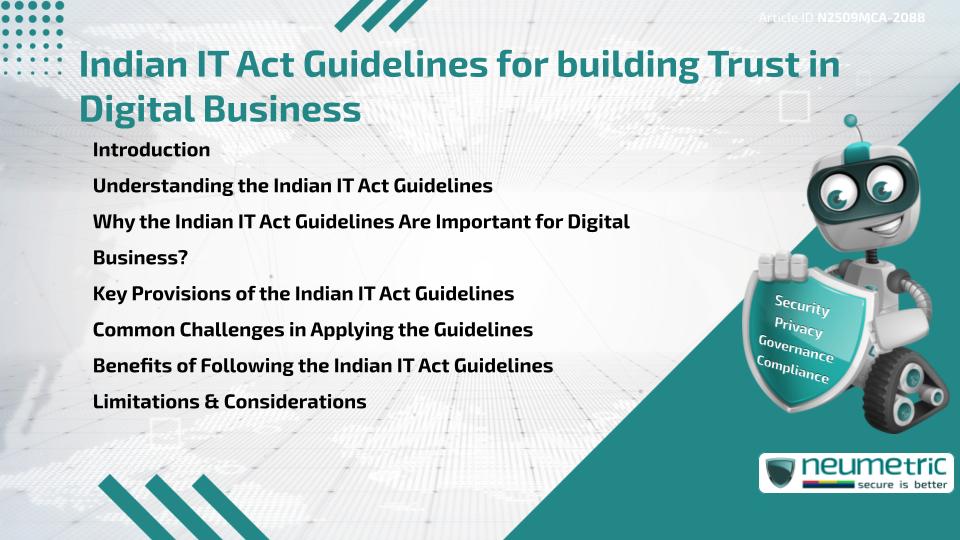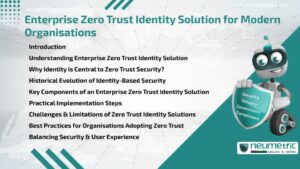Table of Contents
ToggleIntroduction
The Indian IT Act guidelines form the foundation of Digital Governance & Security practices in India. Based on the Information Technology Act, 2000, these guidelines outline rules for Electronic Records, CyberSecurity & Protection of Sensitive Information. For Enterprises, Compliance with these provisions is not only a Legal Obligation but also a way to build trust in Digital Business Environments.
Understanding the Indian IT Act Guidelines
The Information Technology Act, 2000 & its amendments were introduced to regulate Digital Activities, Combat Cybercrime & Ensure safe Online Transactions. The Indian IT Act guidelines translate these Legal Provisions into Practical measures for Enterprises, Service Providers & Intermediaries.
They cover a wide scope, including Electronic Authentication, Data Security, Privacy Obligations & Cybercrime Penalties. For details, see the Ministry of Electronics & IT.
Why the Indian IT Act Guidelines Are Important for Digital Business?
As businesses move Online, Customers expect safe & secure interactions. The Indian IT Act guidelines play a crucial role by:
- Legitimising Electronic Records & Digital signatures.
- Protecting Sensitive Personal Data & Information.
- Defining Penalties for Cybercrime & Data Misuse.
- Clarifying the liability of Intermediaries & Service Providers.
- Promoting Accountability, Transparency & Trust in Digital Transactions.
The NASSCOM Data Protection resources highlight How strong Compliance strengthens India’s Digital Economy.
Key Provisions of the Indian IT Act Guidelines
- Data Protection & Security – Organisations must adopt reasonable Security Practices to safeguard Sensitive Personal Data.
- Cybercrime Provisions – Penalises offences such as Hacking, Identity Theft & Fraud.
- Electronic Governance – Recognises Electronic Records, Contracts & Digital signatures.
- Intermediary Liability – Defines the role of Service Providers in managing Unlawful content.
- Grievance Redressal – Requires a Grievance Officer to address Privacy & Security concerns.
- Incident Reporting – Mandates timely reporting of certain Cyber Incidents to Authorities.
For International context, see the OECD Digital Security principles.
Common Challenges in Applying the Guidelines
- Awareness Gaps – Employees & Vendors may lack knowledge of Obligations.
- Regulatory Overlaps – Enterprises must navigate multiple Privacy & Security laws.
- Vendor Risks – Third Parties handling Sensitive Data can expose Businesses to Liability.
- Resource Limitations – Smaller Firms may find Compliance Costly & Complex.
The NCSC UK cyber Risk guidance provides useful strategies to mitigate these challenges.
Benefits of Following the Indian IT Act Guidelines
- Legal Compliance – Reduces the Risk of Penalties & Litigation.
- Customer Trust – Demonstrates Accountability & Commitment to Privacy.
- Business Continuity – Protects against Cyber Incidents that disrupt Operations.
- Competitive Advantage – Enhances Credibility in Domestic & International Markets.
Limitations & Considerations
While the Indian IT Act guidelines provide a baseline, they are not as comprehensive as Global Standards like GDPR. The Digital Personal Data Protection Act, 2023, expands Privacy Obligations further, requiring Enterprises to adapt. Businesses must view the guidelines as part of a broader Compliance & Governance strategy.
Takeaways
- The Indian IT Act guidelines regulate Digital Business practices, Data Protection & CyberSecurity.
- They help Enterprises build trust by ensuring Accountability & Compliance.
- Adoption enhances Legal Protection, Customer Trust & Digital Resilience.
FAQ
What are the Indian IT Act guidelines?
They are rules under the Information Technology Act, 2000, covering CyberSecurity, Privacy & Electronic Governance.
Why are they important for Businesses?
They protect Sensitive Data, Prevent Cybercrime & Build Customer Trust.
Who must Comply with the Guidelines?
All Enterprises, Intermediaries & Service Providers operating in India’s Digital Space.
Do the guidelines cover Electronic Contracts?
Yes, Digital Records & Signatures are Legally recognised under the IT Act.
Are the guidelines sufficient for Data Privacy?
They form a foundation but must be supplemented with newer laws like the Digital Personal Data Protection Act, 2023.
References
- Ministry of Electronics & IT – Government of India
- NASSCOM – Data Protection Resources
- OECD – Digital Security Principles
- NCSC UK – Risk Management Collection
- IT Governance – CyberSecurity Resources
Need help for Security, Privacy, Governance & VAPT?
Neumetric provides organisations the necessary help to achieve their CyberSecurity, Compliance, Governance, Privacy, Certifications & Pentesting needs.
Organisations & Businesses, specifically those which provide SaaS & AI Solutions in the Fintech, BFSI & other regulated sectors, usually need a CyberSecurity Partner for meeting & maintaining the ongoing Security & Privacy needs & requirements of their Enterprise Clients & Privacy conscious Customers.
SOC 2, ISO 27001, ISO 42001, NIST, HIPAA, HECVAT, EU GDPR are some of the Frameworks that are served by Fusion – a SaaS, multimodular, multitenant, centralised, automated, CyberSecurity & Compliance Management system.
Neumetric also provides Expert Services for technical Security which covers VAPT for Web Applications, APIs, iOS & Android Mobile Apps, Security Testing for AWS & other Cloud Environments & Cloud Infrastructure & other similar scopes.
Reach out to us by Email or filling out the Contact Form…





